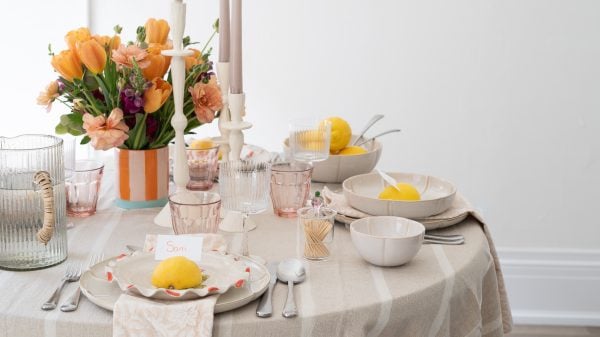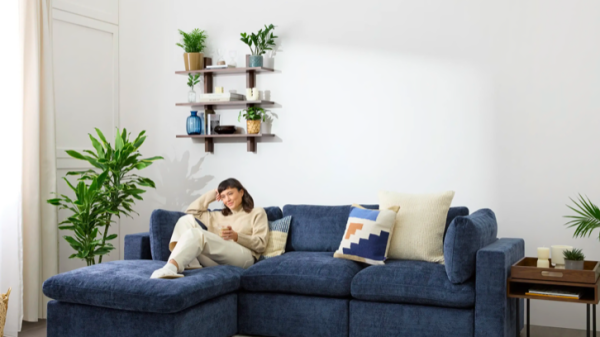As a group of women working towards common goals for STYLE Canada‘s brand and business, we understand the value of peer support in the workplace. So, after our last Supper Club at Soho House, we decided to bring like-minded women in business together and feature them in an ongoing series: #LeadingLadies. Learn more about #LeadingLady Sheryn Saab, founder of sustainable linen company envello, below.

Sheryn Saab, founder of envello
SC: What inspired you to start envello at such a young age?
SS: Entrepreneurship runs in my family and I’ve always been encouraged to start my own business and take risks. Timing is rarely going to be perfect, yet when you come across an opportunity or an idea that you really believe in, you have to throw yourself behind it and do it. It has not always been easy, but it is certainly rewarding.
SC: Was going into the textile business something you always wanted to do, coming from a family involved in the business?
SS: While I knew I’d always start a new business, carrying on the family tradition was not my initial goal. The decision came after a personal experience shopping for linens which made me realize there was a gap in Canada’s homeware space. I realized I had an opportunity to put my knowledge and experience into play to build a brand that not only offered affordable, premium quality products but also helped people love the space they spend up to a third of their lives in.
I do feel fortunate to have been exposed to the textile world at such an early age, attending trade shows, witnessing how business is done around the globe, and learning the technical details. These experiences shaped my ideas around how I would build envello.
SC: Was it nerve-racking to start your own business during a pandemic?
SS: We launched in February 2020 at the outset of the pandemic – in fact, we just celebrated our one year anniversary! It was a very challenging and scary time for us, but we quickly realized that it was also an opportunity. People are craving the power of a good night’s sleep more than ever, and our products are designed to help them get the sleep they deserve.
SC: What is one thing you learned about yourself after you started your business?
SS: Launching envello taught me that situations change every day, and we have to adjust our approach and plans as we go. To realize I’m able to be flexible, deal with uncertainty, and most importantly, adapt to the circumstances while still looking for silver linings, have been key learnings for me.
SC: You studied business in the U.S. – was there anything you weren’t taught in school that presented a learning curve when you started envello?
SS: Honestly, everything was different! My most valuable school experiences weren’t academic. They were all about social skills, communication, empathy, having an open perspective, and most importantly, having the willingness to learn. At school, we study real business cases and theories, but always in a controlled environment. In reality, things change on a day-to-day basis, but that previously acquired discipline and the educational foundation has helped me navigate big challenges.

Cheery yellow bed linens from envello to kick off your new spring sleep routine
SC: Why was Portugal the best place to create your products?
SS: The Portuguese textile industry is globally known for its superior manufacturing and artisanship standards. The country’s heritage is rooted in textiles and artisans learn to combine cutting-edge innovations with old-world techniques and quality materials. Moreover, all companies in Portugal have to comply with environmental legislation to operate. Chances are that if you own a piece of clothing/fabric by a brand that cares about sustainability and quality, its label says ‘Made in Portugal’.
SC: Can you tell us about the design process?
SS: We try to have something in the mix for everyone. Classic, neutral colours for those who like a monochromatic look or who love to mix and match, and warmer, bold tones that evoke that ‘good morning!’ feeling for our more adventurous clients.
I also made sure our designs had useful touches to make bed-making easy such as ‘Top/Bottom’ tags on our fitted sheets, and envelope closures on the pillowcases to keep them in place. We also package all our bedding in handy, reusable cotton bags.
SC: What made sustainable and ethical materials/manufacturing important to you?
SS: We’re committed to protecting the health of our customers and the planet. I needed to create a brand whose practices aligned with the values that are becoming increasingly more important in today’s world. All of our sheets are Oeko-Tex certified, which means that every part of them, right down to the threads and buttons, are produced without the use of harmful chemicals. Our bedding is placed in a reusable fabric bag, and we ship all of our products in 100 per cent recyclable tissue and cardboard boxes.
People also deserve ethical treatment and fair wages for the work they do. Our factories support and are committed to these principles. We took a long time selecting our partners because we wanted to ensure they were responsible producers who were aligned with our values.

An example of the “classic, neutral colours for those who like a monochromatic look”, according to Saab
SC: Why is it important for your brand to offer quality, affordable bedding and linens?
SS: All the brands I looked at while doing my research in Canada had me compromising either affordability or quality. Consumers shouldn’t have to choose between the two. Given the impact that bedding and sleep can have on everything from our moods to energy levels, good bedding shouldn’t be a luxury only some can afford. My mission is to offer quality bedding, priced fairly so that more people have access to a great night’s sleep in a room they love.
SC: What are some things people should look for when purchasing bedding?
SS: Thread count is the one metric people cling to. If you’re in the market to buy new sheets, the sweet spot is usually a count between 200 and 500 – never 1000! Other equally important factors are the provenance of the cotton, the manufacturing of the sheets and yarn’s strength. I devote a whole section to this on our website and it’s a must-read if you ever plan on buying sheets.
Research is also key when it comes to finding the correct fabrics and materials to sleep on. From body temperature and texture to wrinkles and weaves, it is important to buy according to sleep personality and preferences.
SC: How do bedding and linen contribute to our eco-footprint?
SS: In the U.S. alone in 2018, around one million tons of bedding and towels ended up in landfills. While we don’t have localized research on this topic, there’s no reason to think that it’s very different here in Canada. Thankfully, attitudes are changing and the industry is increasingly focused on reducing its environmental impact.
Still, returns are an issue for every bedding company, so we’re tackling this in a couple of ways. We’ve partnered with Furniture Bank, a local Toronto-based charity to provide bedding to families in need. We’re also expanding our sustainability efforts, talking to different groups and people in the community about how we might upcycle our returns, support other local businesses and ensure none of our fabric ends up in landfills.
To check out our entire troop of #LeadingLadies, click here.








